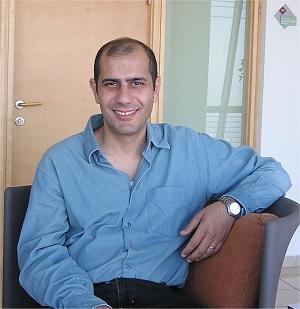A pan-European association is developing recording and reminder systems that will allow the elderly to keep track of meetings and conversations they've had, restore content, manage a to-do list and improve their memory skills

The IBM research laboratory in Haifa Cooperates with a number of European bodies in developing new technology and creating a "future home" that will support managing an active life in old age and help prevent the decline of cognitive skills in the elderly population.
The IBM laboratory in Haifa contributes to the project technologies developed in Israel and research capabilities in the field of converting speech to computerized text, Identifying a speaker by his voice, Diagnosis of emotions based on video recording, and synthesis of computerized text for speech in a human voice produced by a machine.
The Hermes project, in which IBM's research laboratory in Israel participates, is designed to help the vision of extending the possibility of an independent life for the elderly, through assistance to their active fitness. Developing innovative and non-intimidating technology that will meet the needs of this population is a challenge for the global technological community in general - and the European one, in particular: the proportion of elderly people in the European population is steadily increasing, and it is expected to reach a peak in the coming years.
The Hermes project for cognitive therapy that enables an active life in old age, is based on audio and image processing, in the way of developing home and mobile solutions that will help adults fight the natural decline in cognitive skills, typical of the aging process. The three-year project focuses especially on the development of a convenient user interface, which will allow even adults who are not familiar with operating computers and electronic systems to benefit from the new technology.
As age increases, human cognitive ability is impaired, and the phenomenon of forgetfulness affects almost every aspect of life. The problem is especially serious among old people in the current generation, who do not feel comfortable using technological gadgets and systems that might make it easier for them. Many in the older population completely shy away from any attempt to adopt new technology.
The Hermes project brings together and integrates the activities of experts in a variety of fields, from gerontology (aging medicine) to speech processing, from hardware integration to user-centered planning and design. All of these are put together in order to build systems that will allow cognitive support for adults.
In the first phase of this collaboration, employees develop at the CURE Research and Use Engineering Center in Austria and INGEMA in Spain in order to better understand the content that the elderly need to remember. The technological partners in the project, including the IBM Research Laboratory in Haifa, the Information Technology Institute of Athens, the University of Bradford in the United Kingdom and TXT from Italy, will develop the technologies required to support these needs.

The prototype of the "future home" that will be built as part of the Hermes project, will be equipped with microphones and video cameras that will record conversations and experiences experienced by the elderly - according to his choice. The elderly will be equipped with a mobile device that will be used to make these recordings, including conversations, experiences, location data and time when these events take place - whether at home or outside. So, for example, it will be possible to record the visit to the doctor's clinic, the meeting with the bank teller or a social gathering. All the information will be stored and saved, processed and analyzed automatically - in order to offer the elderly to retrieve it when necessary, as reinforcement for his personal memory.
Ron Khoury, director of speech technologies at IBM's research laboratory in Haifa, stated that "The Hermes project will enable the research being carried out at IBM in the field of multimedia to take a leap forward, in the way of changing and improving the nature of the everyday lives of people of an older age. The project will make it possible to deal with more complex and dynamic environments, which require new and innovative approaches. These approaches will also be able to work in the business world, where they can be used to analyze phone calls at service centers, understand the content of news or video broadcasts, or derive new knowledge from any activity that involves speech."
The final goal of the Hermes project is to build a prototype of a system that will offer three types of services. The first service will be assistance in remembering events from the recent past. So, for example, an elderly woman could ask the system - in speech - "What did my daughter say to me yesterday when we were talking about the weather". The system will search the call recording database based on the defined time window and the keywords of the content - and will allow the user to play the call recording, in audio or video. A second service that will be developed as part of the system will offer reminders for daily activities. So, for example, if you notice that the coffee box is about to be emptied - you can record a reminder along the lines of "buy coffee" while preparing the coffee. The system will know how to cross between this reminder and the store where the user usually shops - and the next time the user passes by this store, the mobile device will play a voice reminder to make the required purchase, while using a computerized system for human voice synthesis.
A third service that will be possible on the basis of the new technology developed as part of the pan-European project, is that of memory practice based on real personal experiences. Thus, for example, the system will at all times maintain a list of meetings - some of which have already been held and some of which are expected in the future. The system can display these appointments, ask the user to organize them according to categories, specify the exact time of meeting with the doctor next week, or make a list of appointments in their correct order. Games of this type help preserve human memory capabilities, and are based on real conversations and experiences that have been recorded in the past or entered into the system as future meetings.

One response
I am approaching the relevant age:
The article reminded me to add "vinegar" to the shopping note.